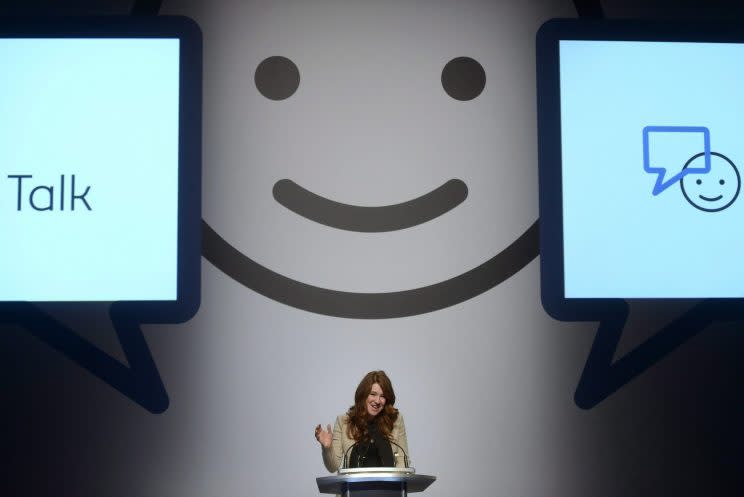Bell Let's Talk keeps the conversation going on mental health

It was personal tragedy that spurred Mary Deacon to sign on with Bell Canada when they came knocking seven years ago, looking for someone to spearhead their idea for an initiative on mental health.
Deacon lost two brothers to depression and suicide.
“My family has been very deeply and personally touched by mental health issues,” Deacon, chairwoman of the Bell Let’s Talk mental health initiative, told Yahoo Canada News.
Since it began, the program has raised about $80 million for mental health research, anti-stigma campaigns, community-level services and education.
There are four pillars to the program: the Let’s Talk campaign to combat the stigma of mental health issues; research funding; funding better access to care; and leading by example with their own workplace mental health initiatives.
The jewel of the program is the wildly successful Let’s Talk Day, taking place Wednesday.
Bell donates 5 cents to mental health programs for every text message, mobile and long distance call by Bell Canada and Bell Alliant customers, as well as for every tweet with the hashtag #BellLetsTalk and every view of their Facebook video.
This year, they’re adding donations for every Instagram post with the #BellLetsTalk hashtag and every Snapchat use of the Let’s Talk geofilter.
Last year, there were nearly 126 million interactions, raising a $6.3 million-donation from Bell for mental health initiatives.
“The more Canadians engage and the bigger and the louder the conversation grows, it drives more Bell donations to mental health,” Deacon said.
Bell’s goal is to raise and donate at least $100 million by 2020.
Six-time Olympic medal winner Clara Hughes has been the frank public face of the year-round campaign, joined this year by a host of high-profile Canadians, including comedian Howie Mandel, singer Serena Ryder, Toronto Maple Leafs head coach Mike Babcock, and Quebec comedian Michel Mpambara. This year, the program has also enlisted varsity athletes at 54 university across the country to raise awareness at sporting events and rallies.
Deacon and Hughes are in the midst of a coast-to-coast-to-coast tour, handing out cheques to some of the hundreds of community organizations that receive funding.
Among them, Deacon says she was touched by a youth program in Fort McMurray.
“We saw all those horrible pictures and the sad, sad stories but what we saw last week was resilient, proud and hopeful people in Fort McMurray. It was just incredibly uplifting,” she said.
They also renewed funding for a distress line run by a legion of volunteers in Nunavut.
On Tuesday, they presented St. John’s Ambulance with funds to embed mental health first aid in basic first aid training. Last year a similar gift was provided to the Red Cross to do the same thing.
“Just as you learn about what to do with somebody’s broken leg or someone who’s had a heart attack, you’re going to learn the basics of what to do if somebody is experiencing mental health issues,” Deacon said.
They also renewed funding for a chair in mental health and anti-stigma research at Queen’s University — the only one of its kind in the world.
“Stigma is the No. 1 reason that people with mental health issues don’t seek treatment,” Deacon said.
Deacon says the team had no idea when the program began in 2010 that it would grow so big, so quickly.
It’s been a bittersweet victory, she says.
“I am very proud of how far the mental health conversation has come,” she said. “I know the shame and embarrassment that my brothers felt… and I believe and I see around me today that things are changing.”
But there’s more to be done, she says.
“There are still far too many tragic stories where people haven’t received the help they need,” she said. “So we hope the number is even bigger this year, which really helps send that message that Canadians care about mental health.”



